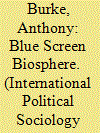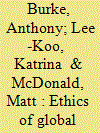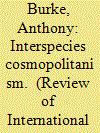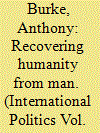|
|
|
Sort Order |
|
|
|
Items / Page
|
|
|
|
|
|
|
| Srl | Item |
| 1 |
ID:
075577


|
|
|
|
|
| Publication |
London, Routledge, 2007.
|
| Description |
xi, 284p.
|
| Standard Number |
0415384643
|
|
|
|
|
|
|
|
|
|
|
|
Copies: C:1/I:0,R:0,Q:0
Circulation
| Accession# | Call# | Current Location | Status | Policy | Location |
| 052071 | 355.033/BUR 052071 | Main | On Shelf | General | |
|
|
|
|
| 2 |
ID:
075893


|
|
|
|
|
| Publication |
London, Routledge, 2007.
|
| Description |
xii, 284p.
|
| Standard Number |
9780415384643
|
|
|
|
|
|
|
|
|
|
|
|
Copies: C:1/I:0,R:0,Q:0
Circulation
| Accession# | Call# | Current Location | Status | Policy | Location |
| 052106 | 355.033/BUR 052106 | Main | On Shelf | General | |
|
|
|
|
| 3 |
ID:
168415


|
|
|
|
|
| Summary/Abstract |
From the social contract theory of Hobbes and Locke to the United Nations Charter, the sovereign state has formed the fulcrum of political order and law. Yet in the Anthropocene, this humanist political containment fails to grapple with humanity's dangerous enmeshment with the ecological systems of planet Earth. This article addresses one aspect of this dilemma by focusing on the international law and governance of biodiversity, which presents a “blue screen” biosphere: a material simulation that enables a double disappearance of biodiversity from the text of international law and from the actuality of the world. Through a critique of the figure of the “natural resource,” the article finds that the founding texts of international environmental law entrench a twofold humanism-as-statism that simultaneously supports the geopower of the state to facilitate the capitalist appropriation of the nonhuman and imports the modern metaphysics of the human domination of nature into international customary law. Such legal-political ontologies block a path to a more hopeful system of global ecological law and governance based on the “rights of nature” that might be able to honor the intrinsic value of the biosphere as a rich, agentic, and communicative whole, fundamental to the Earth's survival.
|
|
|
|
|
|
|
|
|
|
|
|
|
|
|
|
| 4 |
ID:
145151


|
|
|
|
|
| Summary/Abstract |
The security agenda is going global. Key threats such as weapons proliferation, disease, terrorism and climate change cannot be addressed unilaterally by states, and require a global perspective to both understand and respond effectively to them. There are therefore powerful pragmatic reasons for embracing a global security perspective. This article, however, suggests that a compelling moral case also exists for viewing security in global terms. National and international security discourses are at odds with the realities of world politics and orient towards the preservation of a status quo that is failing much of the world's population, now and into the future. In this context, this article makes a case for cosmopolitan ethical principles underpinning a global security perspective. Only an ethics that does not discriminate between groups is defensible as a general set of principles. A global security perspective should be underpinned by three cosmopolitan ethical principles which dictate, firstly, that all security actors have responsibility (albeit differentiated) to create security for all; secondly, they should act with consideration of the future implications of their actions in mind; and, thirdly, they should proceed as if their actions will become global over time and space. While not without challenges and dilemmas, such a perspective is urgently needed in contemporary global politics.
|
|
|
|
|
|
|
|
|
|
|
|
|
|
|
|
| 5 |
ID:
193305


|
|
|
|
|
| Summary/Abstract |
Cosmopolitanism claims to be the most just and inclusive of mainstream approaches to the ethics and practice of world order, given its commitment to human interconnection, peace, equality, diversity, and rights, and its concern with the many globalised pathologies that entrench injustice and vulnerability across borders. Yet it has largely remained oblivious to the agency, power, and value of non-human life on a turbulent and active Earth. Without rejecting its commitments to justice for human beings, the article challenges its humanism as both morally and politically inadequate to the situation of the Anthropocene, exemplified by the simultaneous crises of climate change, mass extinction, and the COVID-19 pandemic. In answer, the article develops new grounds and principles for an interspecies cosmopolitanism, exploring how we can reimagine its ontological foundations by creating new grounding images of subjectivity, existential unity, institutional organisation, and ordering purpose. These, in turn, can support political and institutional projects to secure the rights of ecosystems and people to flourish and persist through an increasingly chaotic epoch of human dominance and multispecies vulnerability across the Anthropocene Earth.
|
|
|
|
|
|
|
|
|
|
|
|
|
|
|
|
| 6 |
ID:
061929


|
|
|
| 7 |
ID:
051489


|
|
|
| 8 |
ID:
087468


|
|
|
| 9 |
ID:
093671


|
|
|
|
|
| Publication |
2009.
|
| Summary/Abstract |
Is nuclear strategic reason rational? Barack Obama's April 2009 speech looking towards a world free of nuclear weapons appeared to promise positive new directions in global disarmament and non-proliferation. Yet it came on the heels of one of the most destabilising periods in global nuclear security since the early 1980s. This article argues that the growing interpenetration of nuclear and conventional conflict, and the dangers of nuclear terrorism, provide disarmament with compelling security logic. However, progress will hinge on key states adopting nuclear postures that reduce nuclear dangers and can acknowledge the fundamental impossibility of nuclear strategy as a system of reason: one that has never been able to connect nuclear means and security ends in a way that is either viable or legitimate. In an era of radically asymmetric conflict and competition, disarmament is an imperative, but to succeed it must find a rational way through strategic irrationality.
|
|
|
|
|
|
|
|
|
|
|
|
|
|
|
|
| 10 |
ID:
145984


|
|
|
|
|
| Summary/Abstract |
Planet Politics is about rewriting and rethinking International Relations as a set of practices, both intellectual and organisational. We use the polemical and rhetorical format of the political manifesto to open a space for inter-disciplinary growth and debate, and for thinking about legal and institutional reform. We hope to begin a dialogue about both the limits of IR, and of its possibilities for forming alliances and fostering interdisciplinarity that can draw upon climate science, the environmental humanities, and progressive international law to respond to changes wrought by the Anthropocene and a changing climate.
|
|
|
|
|
|
|
|
|
|
|
|
|
|
|
|
| 11 |
ID:
082352


|
|
|
|
|
| Publication |
2008.
|
| Summary/Abstract |
Taking its inspiration from Patricia Owens' important and original new book on Hannah Arendt and international relations, this essay considers how Arendt's many scattered remarks on humanity, world order and cosmopolitanism work for us today - a time when a worthwhile 'cosmopolitanisation' of international law (such that its subjects are individual humans as much as states) coexists with darker appropriations of the idea of humanity to legitimise coercive interventions and liberal imperialism. Whilst agreeing with Owens that Arendt's thought offers us significant critical tools to question the latter, I depart from Arendt's general scepticism of a moral subject called humanity, and argue that the time has come to reaffirm, rather than question, what is especially sacred in 'the abstract nakedness of being human'
|
|
|
|
|
|
|
|
|
|
|
|
|
|
|
|
|
|
|
|
|